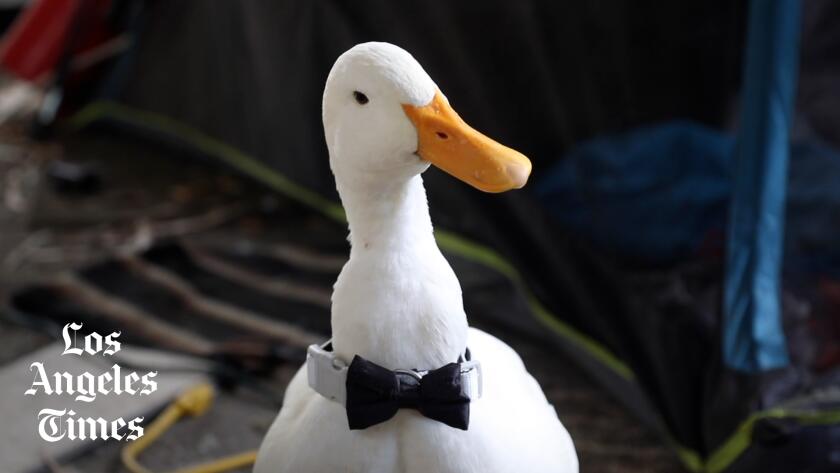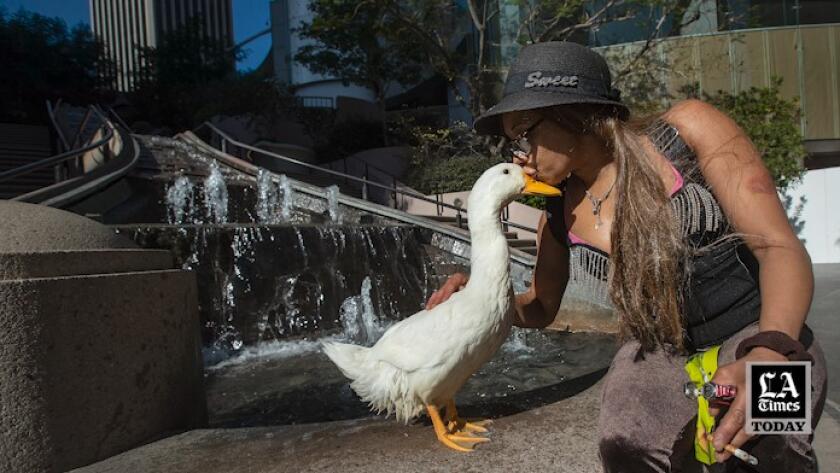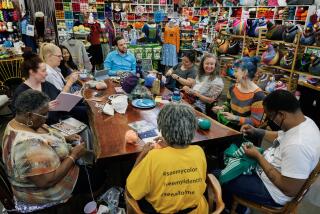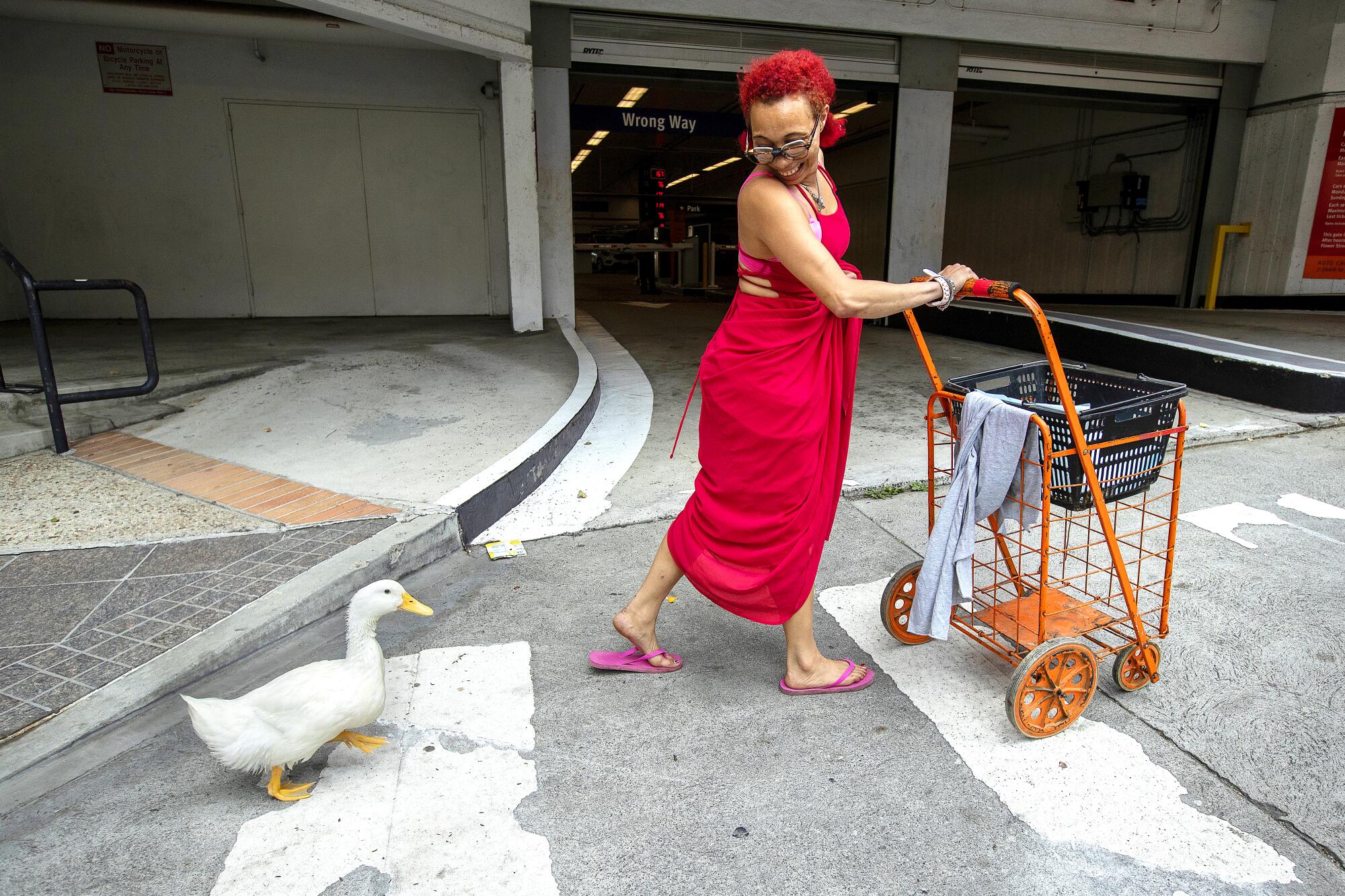
- Share via
No one took a second look at the young woman pushing the maroon stroller through the concrete tangle of downtown Los Angeles. From a distance, Autumn McWilliams could have been any mother out with her baby — until passersby drew near and caught sight of the creamy white feathers.
Then they pointed. They quacked and shouted “Aflac!,” a nod to the ubiquitous insurance spokes-duck. They asked to snap photos.
Inside the stroller was the center of attention: a Pekin duck known as Cardi D.
McWilliams takes Cardi D everywhere: on the bus, the train — even to the dreaded DMV. Walking with the duck feels like being part of a celebrity entourage, she says, with newly minted fans flocking for a closer look.
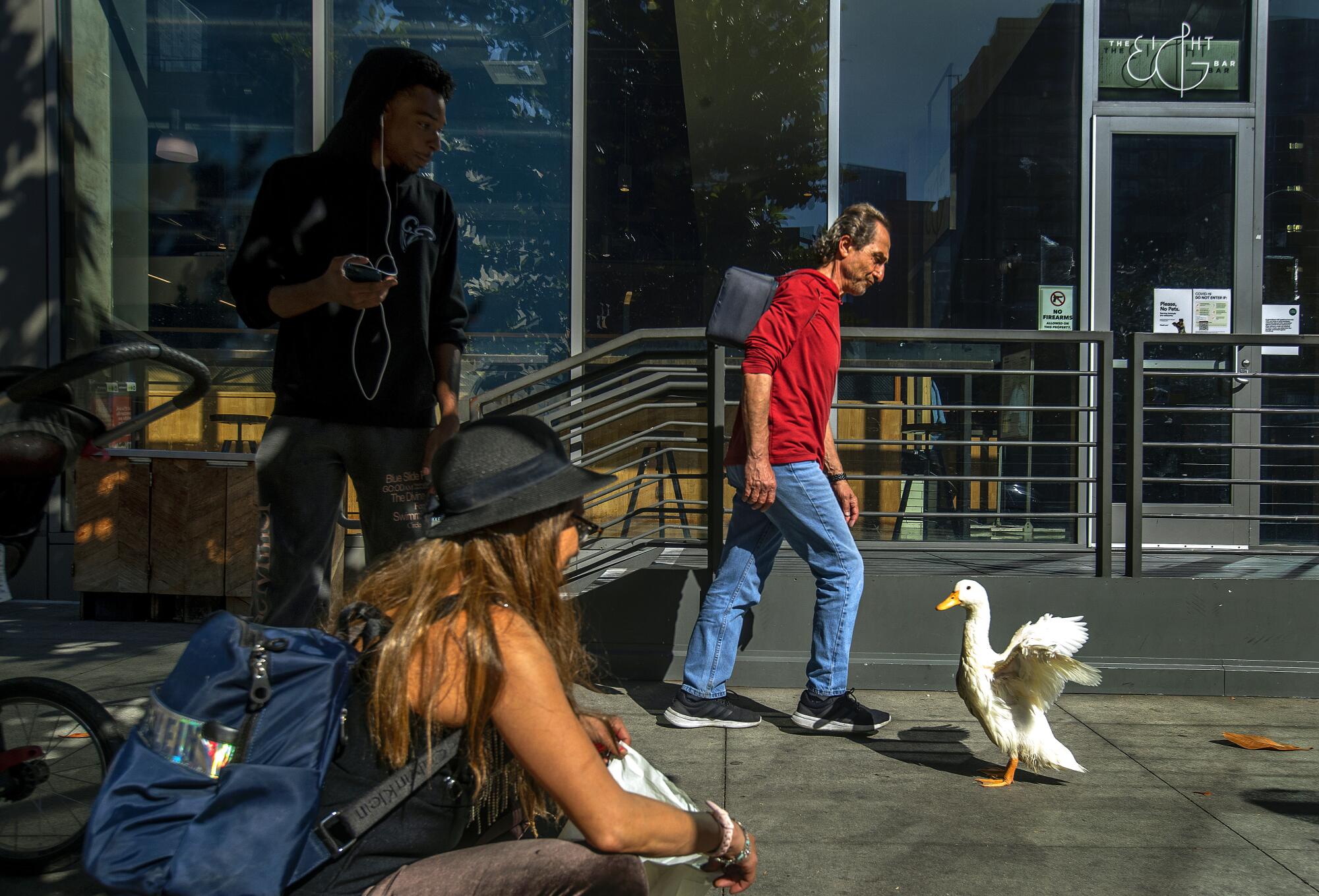
But Cardi D is more than a source of amusement for tourists and locals. In her first four months of life, she has become a comfort animal — an “emotional support duck” — for McWilliams, who has been diagnosed with schizophrenia, depression and anxiety.
McWilliams, 33, has been homeless off and on for half her life. She says she relies on Cardi D to keep her calm. The duck relies on McWilliams to keep her safe.
After all, life on the street — for both humans and ducks — isn’t easy. There are fires. Violence. Overdoses. Loved ones die. Before Cardi D waddled into her life, McWilliams relied on a series of other ducks for support; all four of them died within a matter of months.
McWilliams is constantly reminded that much of her life has been defined by loss.
“Everyone in my life that I love goes away,” she says, watching her duck. “Hopefully she’s able to make it.”
- Share via
Autumn McWilliams, who is homeless, takes her “emotional support duck,” Cardi D, everywhere as she goes about her day.
McWilliams was born in the city of Atascadero, a little more than 200 miles north of Los Angeles. Her mom, she said, abandoned her at the hospital so she could get high. Her parents were in and out of her life.
She spent her first seven years with her father, Martin, who struggled with alcoholism. When he became homeless, McWilliams lived with her aunt in Paso Robles. Sometimes, when she visited her dad, they slept in the back of his truck along a riverbed.
“I saw everyone else with their mom and dad and I didn’t have mine,” she said. “It messed my head up at a young age.”
McWilliams went to live with her father when she was 13 and started to smoke pot and drink with him soon after. In her mind, she said, “that’s when my dad started becoming cool.”
Around the same time, McWilliams was prescribed Ritalin for hyperactivity and Ativan for anxiety. When she was 15, she stopped taking the medication and cut her wrists with a razor blade. She wound up in the hospital.
All along, animals were a big part of her life. Some of her happiest childhood memories, she said, involved trips to Atascadero Lake, where she first fell in love with ducks. At one point, she had a pygmy goat named Odie. But a friend stole the goat and sold it to get money for drugs. The buyer intended to have Odie for dinner.
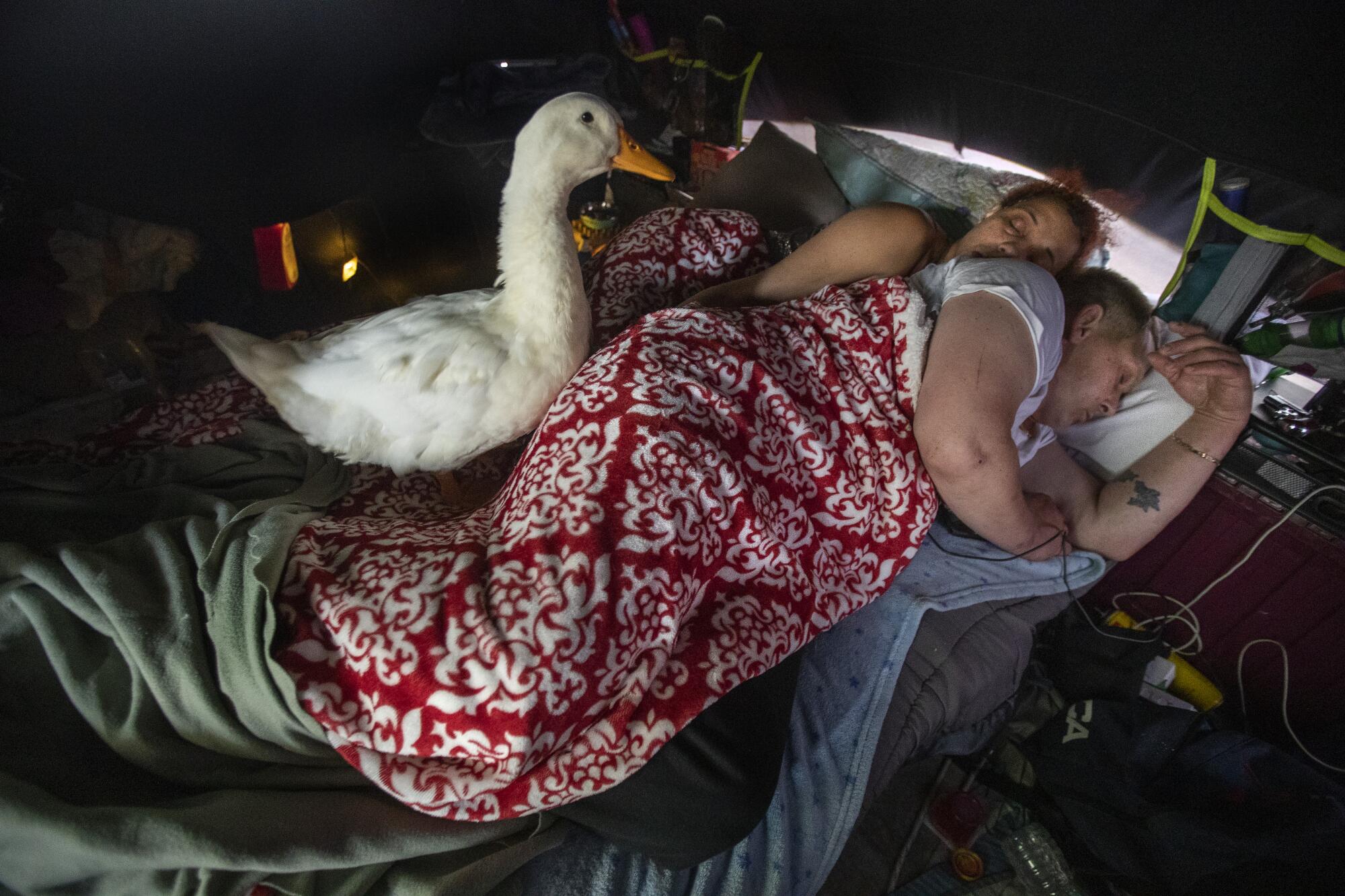
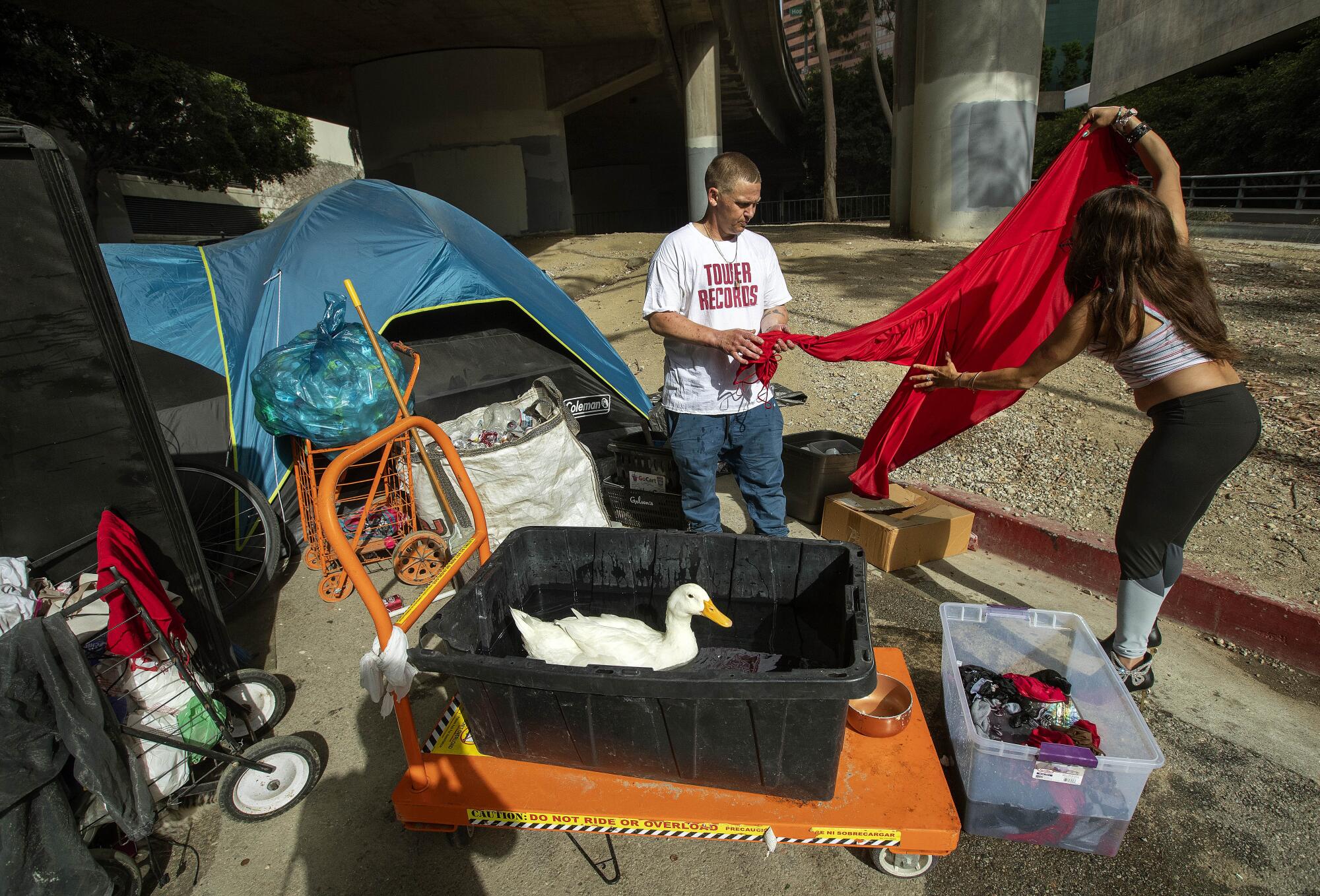
On a morning in early July, four bodies were crowded onto a twin bed inside a blue Coleman tent: McWilliams; her boyfriend, Jack; their gray kitten, Daddy; and Cardi D.
Their neighbors lived in tents as well, all beneath an overpass downtown.
The couple layered puppy pee pads over the sheets to guard against the duck’s incontinence. They kept a mini-air cooler inside to protect Cardi D from heatstroke. They’d replaced their air mattress with a real one, after her claws accidentally popped her inflatable pool.
“Everyone in my life that I love goes away. Hopefully she’s able to make it.”
— Autumn McWilliams, about her emotional support duck “Cardi D”
McWilliams was wearing black heels that added 4 inches to her 5-foot-2-inch frame and made her feel pretty. She’d pulled a brown wig over her short red hair (now fading to orange) and swiped on purple eyeshadow. To help with her astigmatism, she’d fashioned together two pairs of glasses using black electrical tape.
She made Cardi D’s breakfast by pouring ground corn into a plastic container and adding water. She was concerned that Cardi D might eat too fast and choke, but McWilliams was prepared — she had learned a version of the Heimlich maneuver for ducks on YouTube. (It involved resting the duck’s stomach on her forearm and quickly jerking her body downward.)
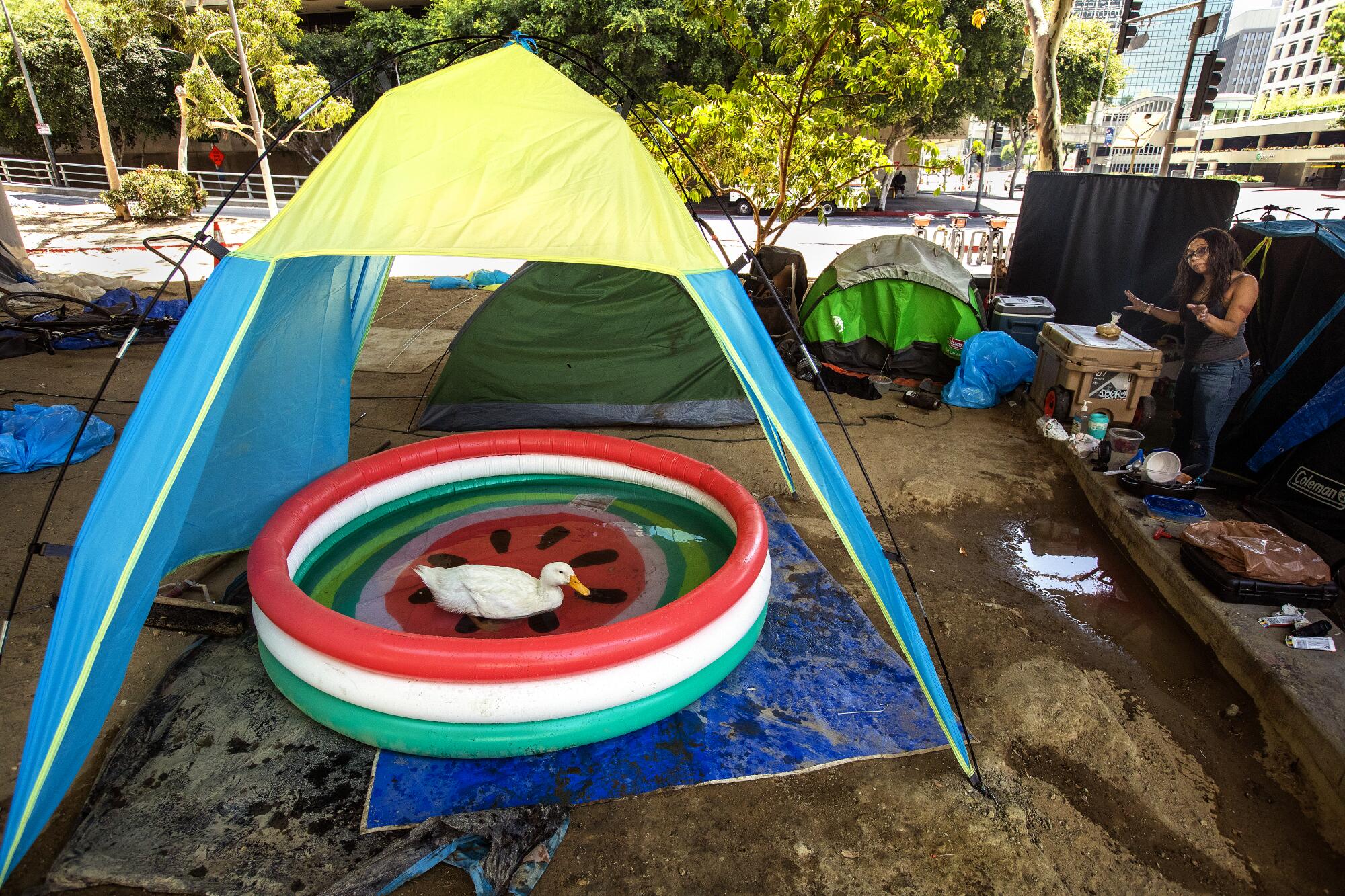
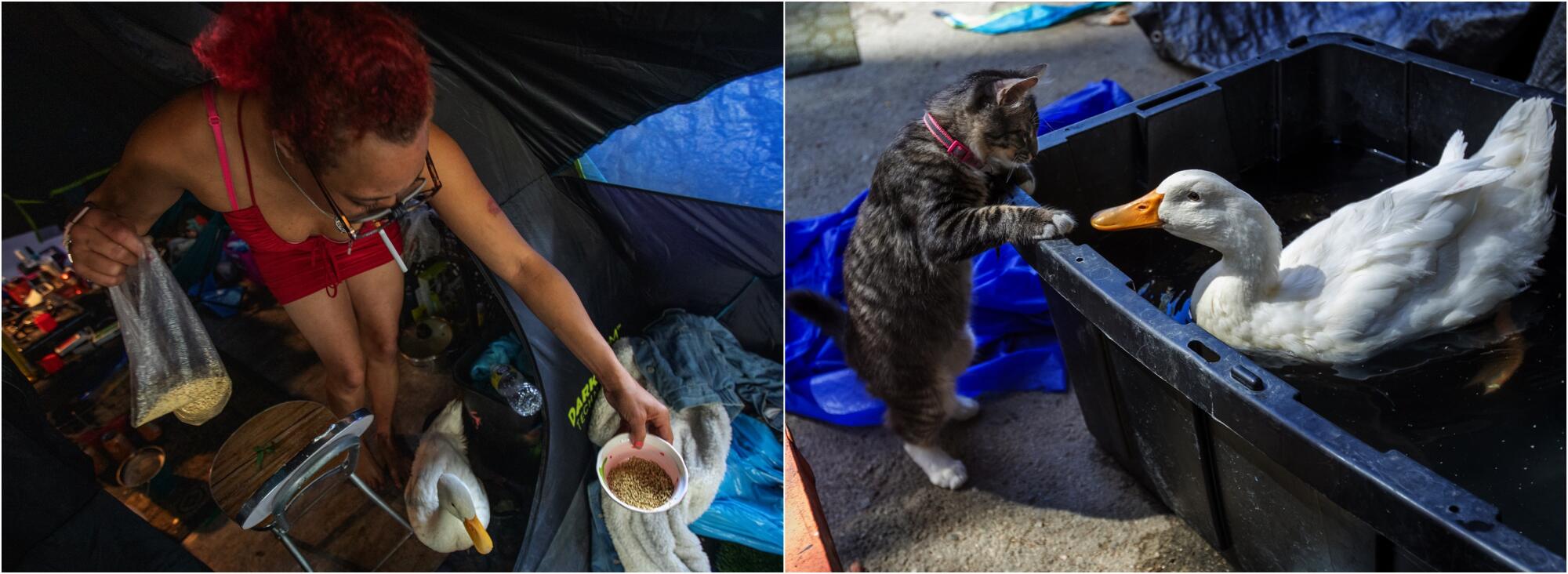
Cardi D also eats watermelon, mealworms, crickets, cockroaches and even cereal. Cocoa Puffs are a favorite.
And she’s going through puberty, McWilliams noted. She no longer sounded like a squeaky toy and was shedding feathers, white tufts floating around her like dandelion fluff in the wind.
McWilliams and her boyfriend Jack had been living under the overpass since May; they moved there after they were kicked out of the L.A. Grand Hotel. They’d been staying at the downtown hotel for almost a year through Project Roomkey, a homeless relief initiative launched at the start of the coronavirus pandemic.. They were living on unemployment and odd jobs.
They had received a housing voucher with the help of their Los Angeles Homeless Services Authority caseworker, but are still struggling to find permanent housing. McWilliams hopes for a house with a yard. Ducks need space.
When it comes to animal companions of the unhoused, Colleen Murphy, LAHSA’s associate director of unsheltered strategies, has pretty much seen it all. There have been dogs, cats, guinea pigs and snakes. LAHSA works on connecting those who are homeless with veterinary care and food resources for their companions, she said. Team members also help get people into interim or permanent housing that allows for pets or emotional support animals.
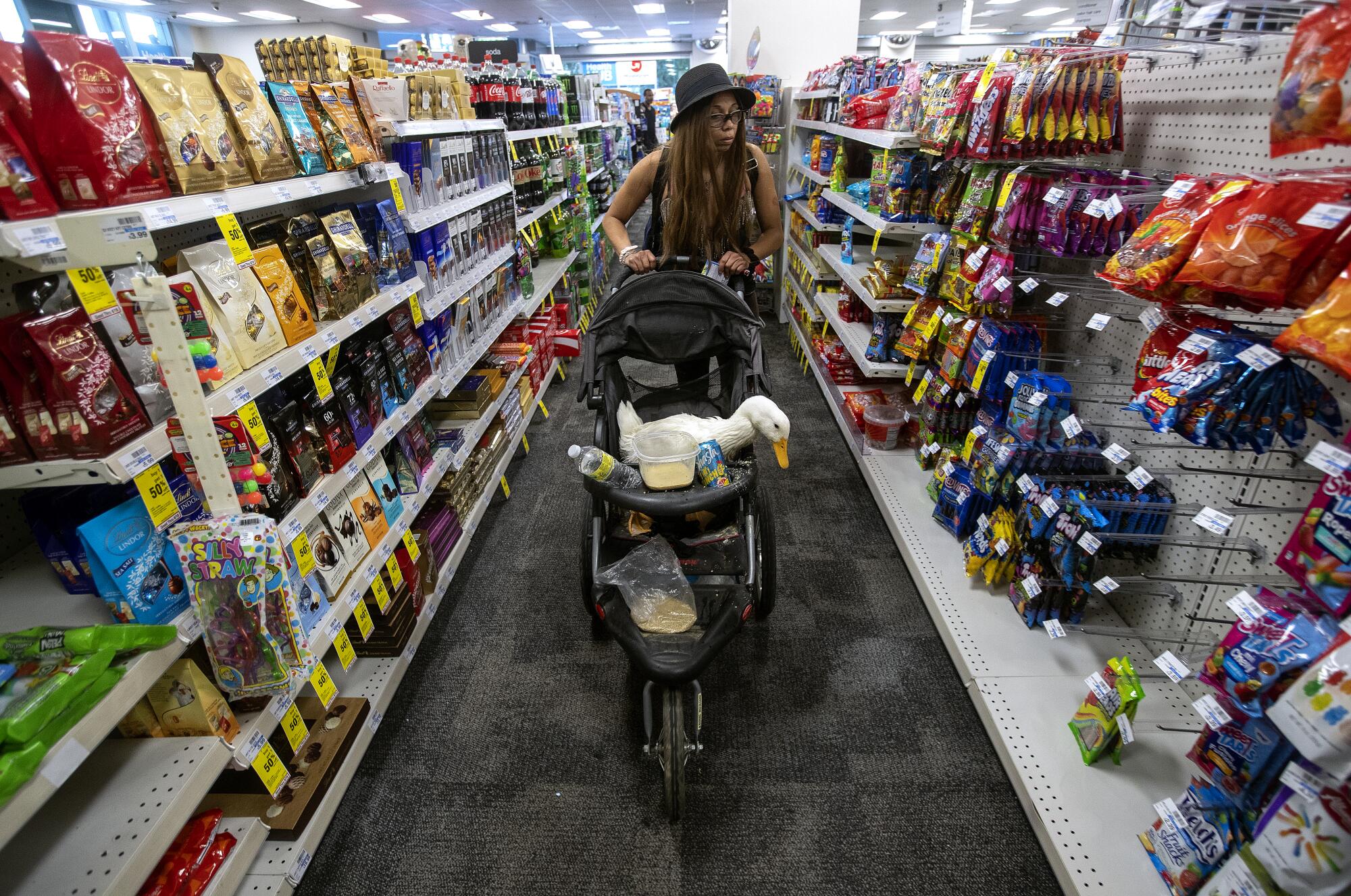
“When we’re serving somebody on the streets, we’re serving the whole need, which includes their companions,” Murphy said. “It’s really important to keep the families whole.”
To make their temporary home cozier, McWilliams and Jack had placed blue-and-yellow carpet, faux wood panels and a patch of artificial turf on the concrete outside their tent. (Cardi D had pooped on all of it.) They stored extra clothing and suitcases in a second tent nearby.
The couple sold $1 sodas out of an ice chest and, throughout the day, sat around a small table with friends who still lived at the Grand. Cardi D was a fixture in every group, a pampered city duck, her claws occasionally adorned with nail polish.
“I’ve never known anyone with a duck for a pet,” said McWilliams’ friend, Brooke, who asked that her last name not be used due to privacy concerns.
An April Fools’ Day baby, Cardi D was 3 weeks old when McWilliams brought her home from a pet shop downtown. The fuzzy yellow duckling fit in the palm of her hand. By then, McWilliams and Jack were experienced duck parents. Cardi D was their fifth. All of them were Pekin ducks.
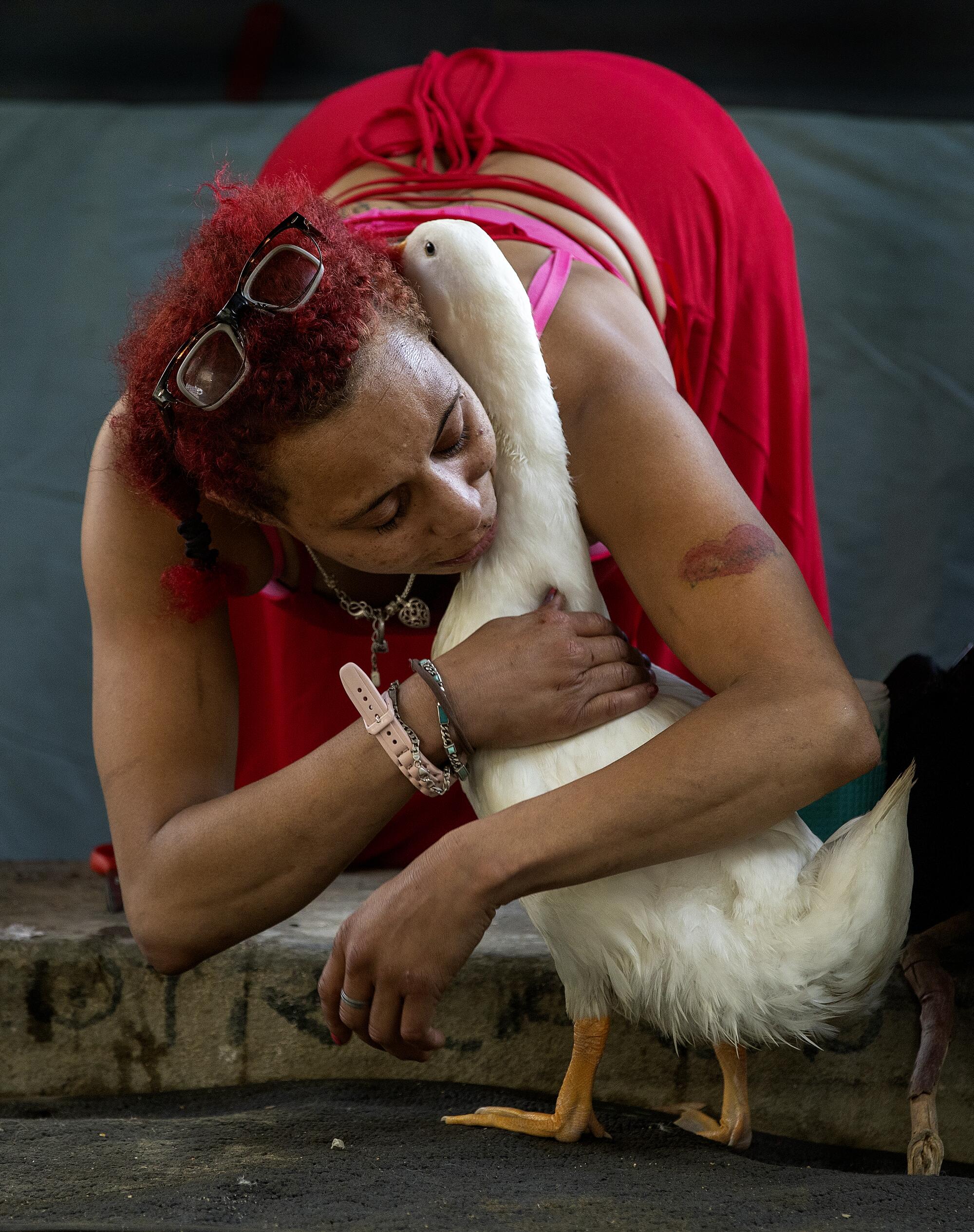
If you go into a Chinese restaurant and order duck, it’ll likely be Pekin, said Richard Blatchford, a poultry extension specialist in the department of animal science at UC Davis. Because they’re bred for meat, he said, they’re fairly large and tend to be docile, making them good companions. (Plus they’re too heavy to fly away, so they’re unlikely to leave.)
“Ducks aren’t quite as social, evolutionarily, as chickens are,” Blatchford said. But, he added, ducks can “definitely imprint on people.”
Jack had found their first duck in 2017, crammed into a tiny cage outside of a pet shop. He called McWilliams and asked: “What would you do if I brought a duck home?”
“Take care of it,” she said. “Raise it.”
They named their first duck Charlie after Eddie Murphy’s brother, who had recently died. But while they were living on skid row, someone snapped the duck’s neck in front of her. The second one came to them with a broken foot that never healed properly, and she died. Another got sick.
She christened her fourth duck Cardi B, after the rapper. McWilliams paid to register her as an emotional support animal, receiving two identification cards, stickers and a red-and-black vest, with the expectation that she could take Cardi B into stores and on public transportation. But last year, the duck ingested an unknown substance and died.
None of the ducks made it past a year.
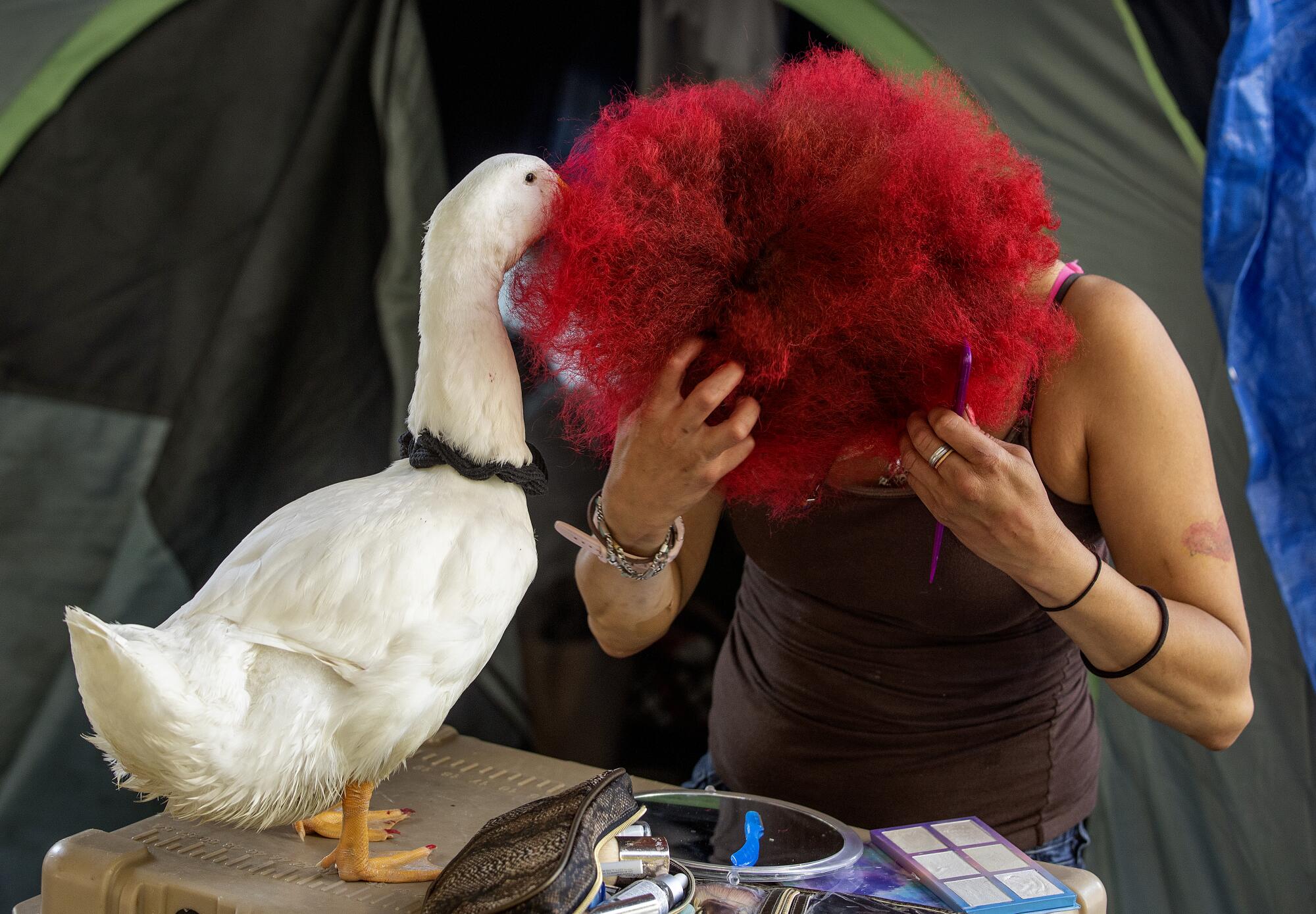
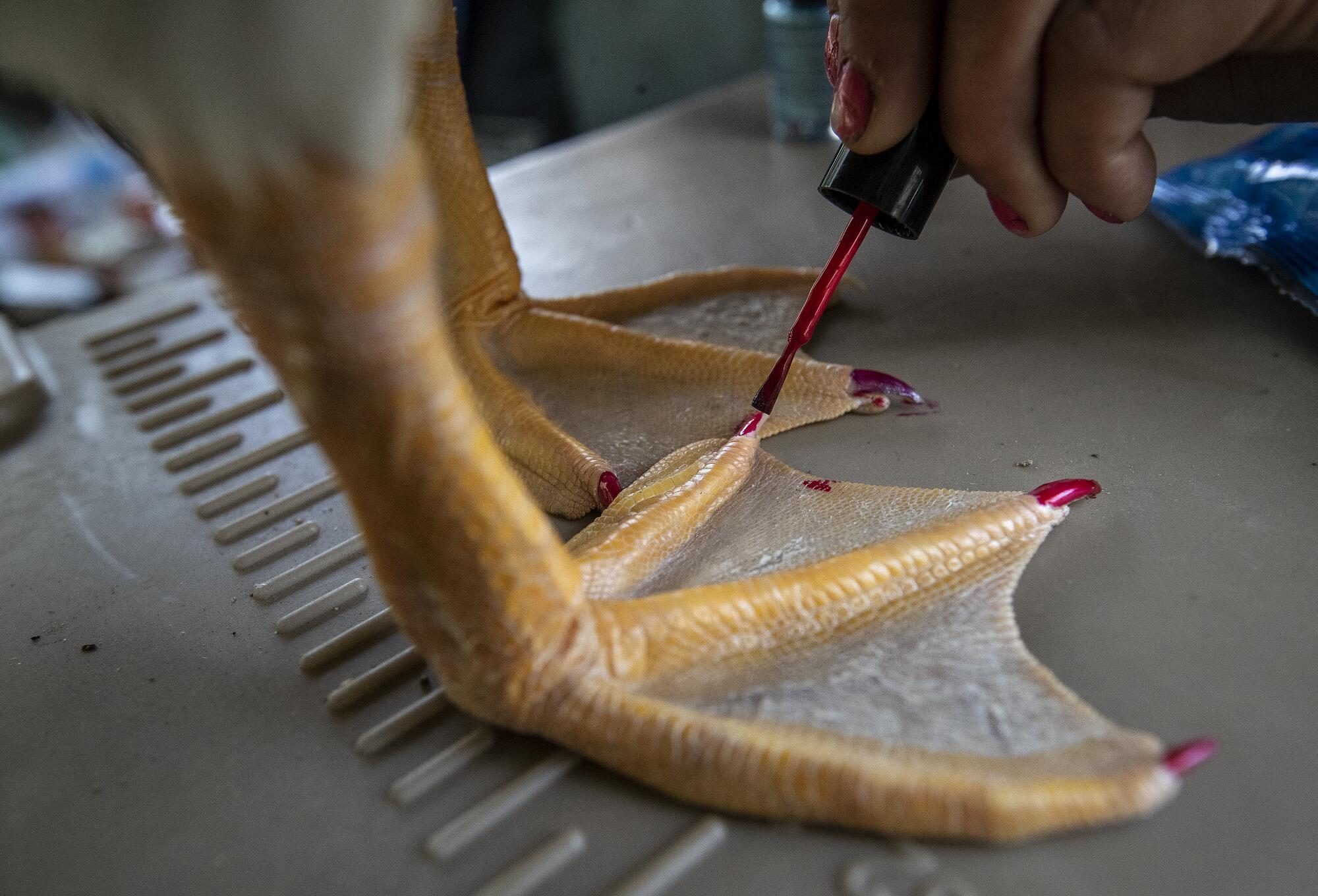
As McWilliams got older, her relationship with her father grew increasingly strained. When she was 21, he picked her up after a party one night, and they argued. McWilliams can’t even remember why.
“I hate you!” she yelled.
That was the last thing she ever said to him.
A little more than two months passed with no communication. In March 2011, McWilliams, who struggled with substance abuse, was at her grandparents’ house trying to get sober. That’s when she saw her dad’s picture flash across the TV screen.
Her father had been inside a Paso Robles laundromat on March 6 when a stranger walked in and stabbed him 30 times. Martin bled to death on the street. He was 46 years old.
The next day, police arrested John Woody Jr., who was eventually convicted of first-degree murder and sentenced to 56 years to life in prison.
After her father’s death, McWilliams started getting high again, “and really going down the drain bad, bad.” She distanced herself from her family. She started living under a bridge in Atascadero. “That was the worst part about my life right there,” she said, teary-eyed. “Once he was gone, I felt like a piece of my heart was missing.”
In 2015, McWilliams came to L.A. with her then-husband looking for the synthetic drug “spice.” The friend who drove them down wouldn’t take them back. So they stayed.
“They were telling me [about] all the help you can get down here and if you want to get sober all the programs you can do. I said, ‘I’m not going back. I’m going to stay here and start a new life,’” McWilliams recalled. “And I’ve been here ever since.”
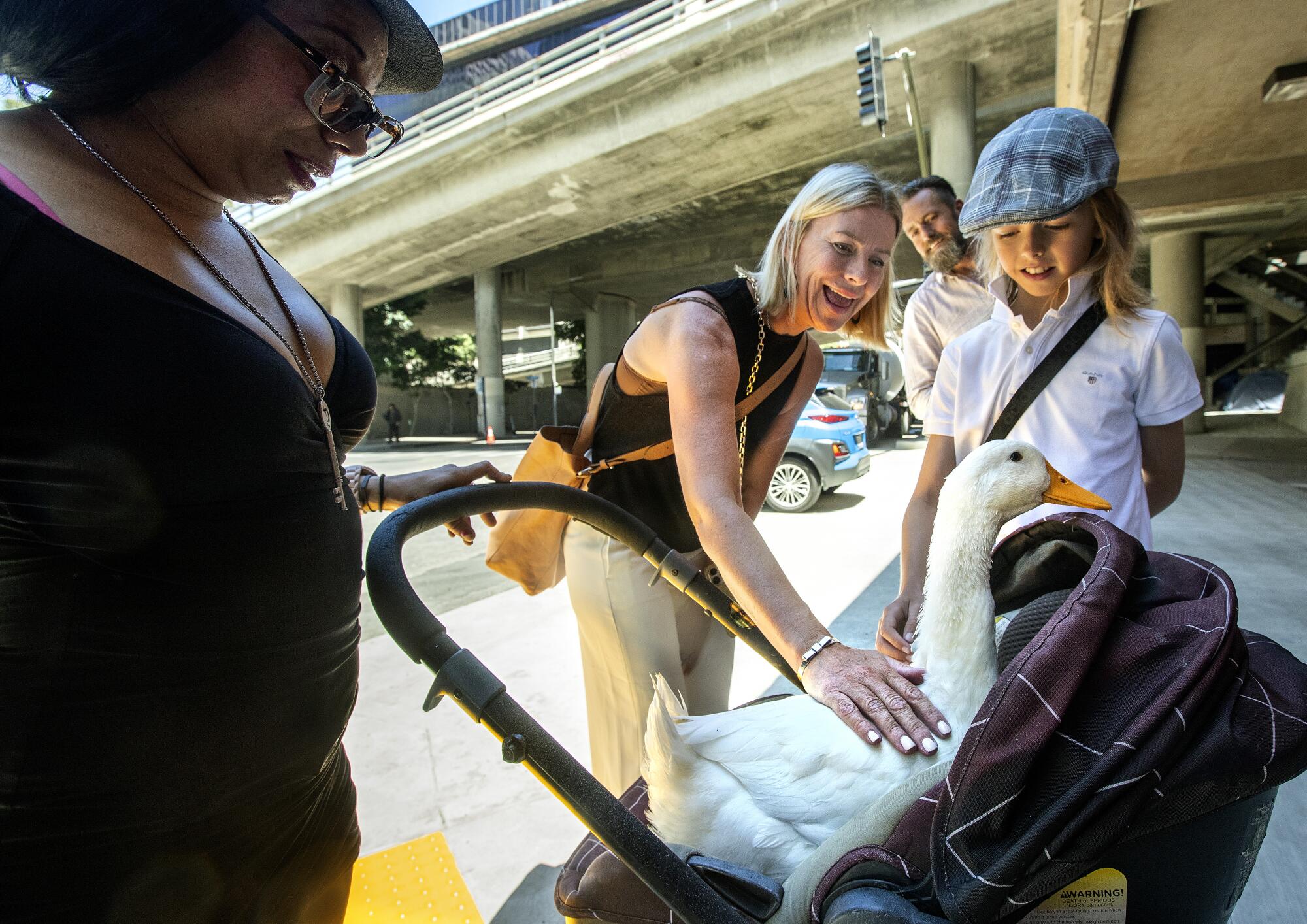
In the vast array of L.A. weirdness, Cardi D is not that unusual. But she does stand out.
On a hot day last month, as McWilliams pushed her duck in the stroller, Angelica Lindemann stopped in a crosswalk to stare. “Only in L.A. can you see something like this,” the 52-year-old, visiting from Sweden, said with a laugh. Lindemann and her 9-year-old son beamed as they stroked Cardi D’s feathers— and Cardi D didn’t bat a grayish-blue eye.
As McWilliams walked in search of a smoke shop, the duck jumped from her throne and waddled along the concrete sidewalk, warmed by the 80-degree weather, trying to keep pace. “The ground’s too hot, I don’t want you walking on the ground,” McWilliams said, scooping the bird up in her arms and putting her back into the stroller. (Although she wasn’t wearing one that day, Cardi D has cloth diapers, including a pink one printed with strawberries and flowers.)
The pair walked another block to a small fountain at the base of the Bunker Hill Steps, across from the Central Library, and McWilliams gently dropped her duck onto the water. In the shadow of the U.S. Bank Tower, one of the tallest buildings in the city, Cardi D dunked her head and tossed water up and over her body to cool down. She glided around the fountain, not seeming to mind that it was only a little bigger than a kiddie pool.
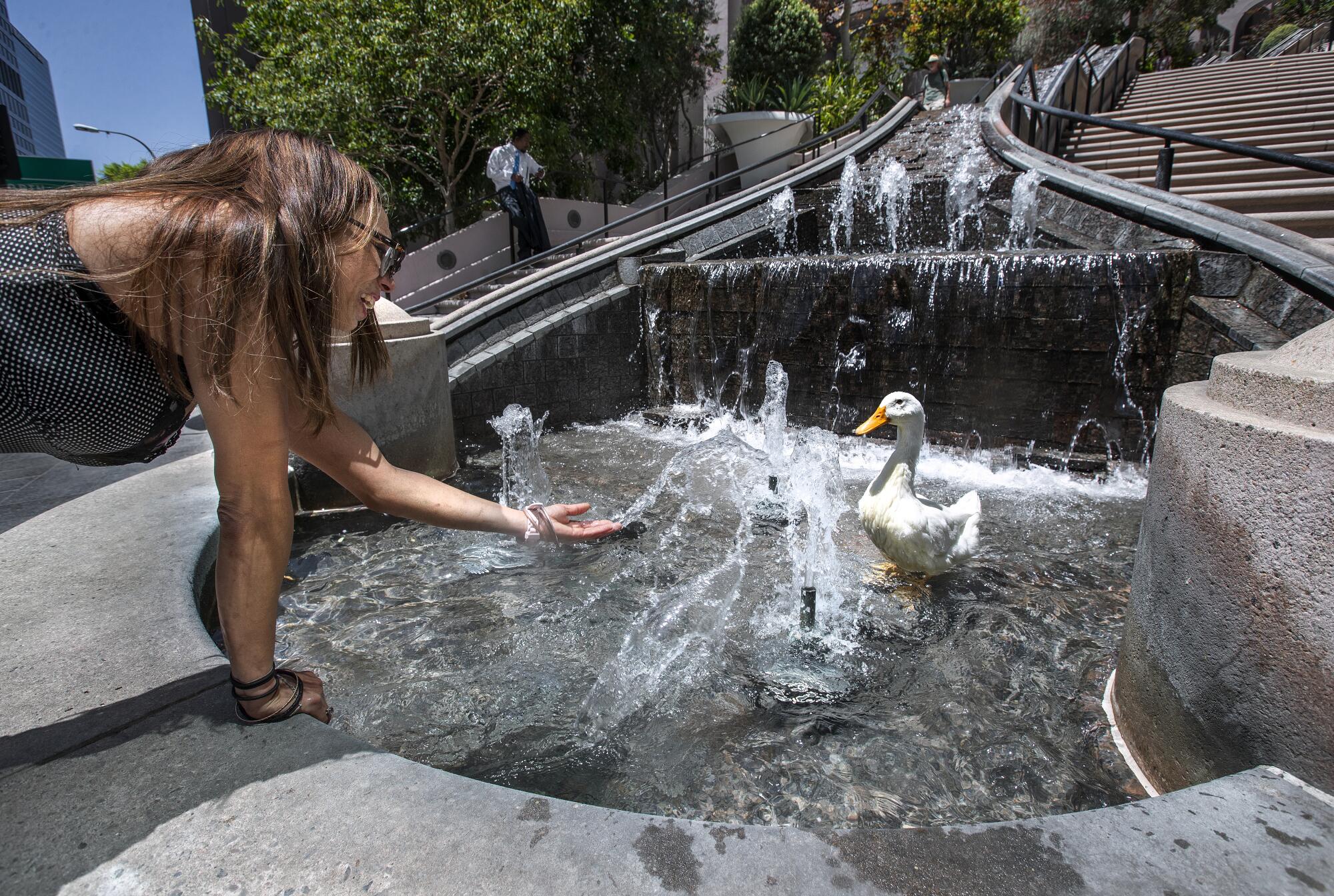
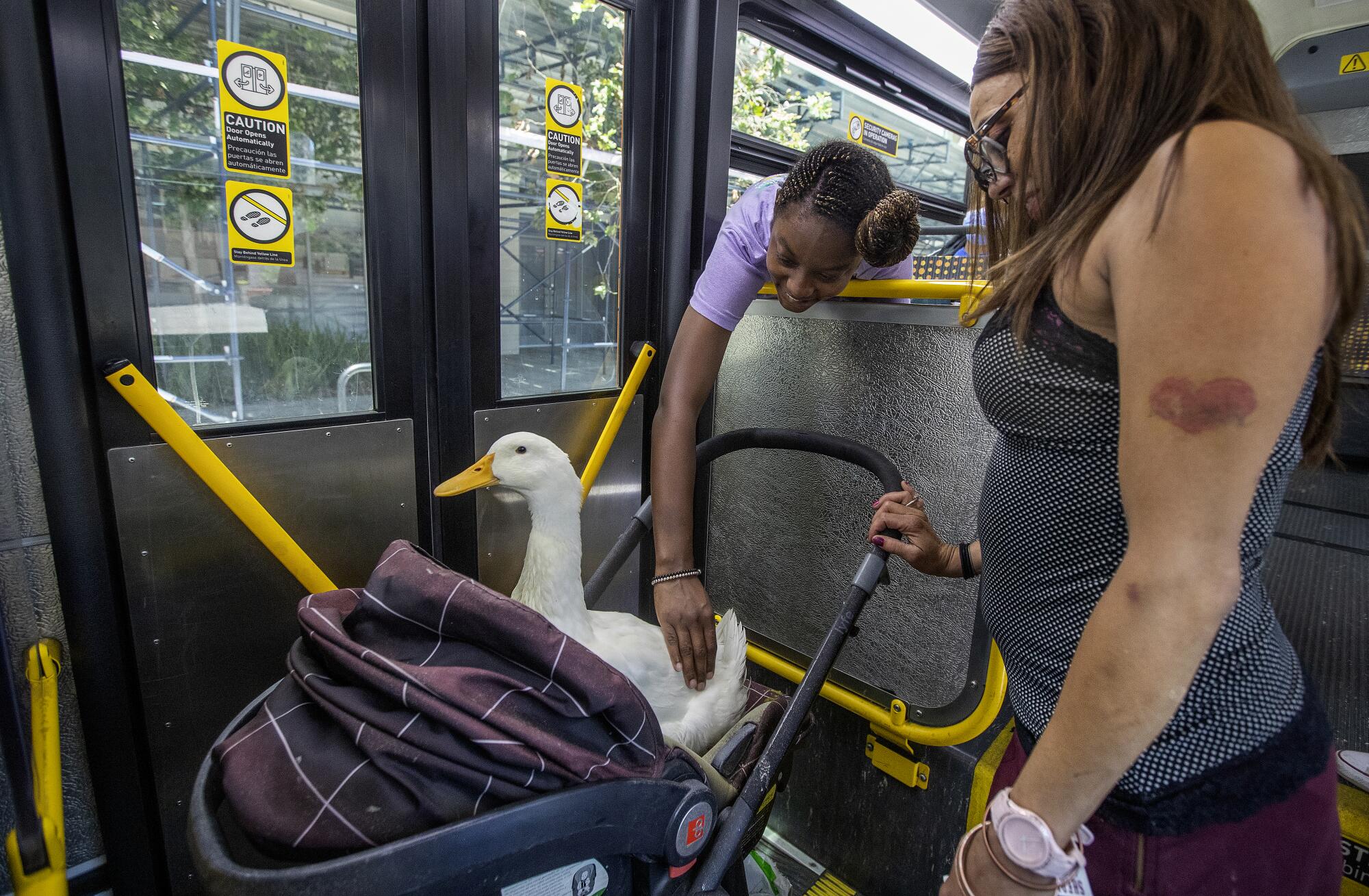
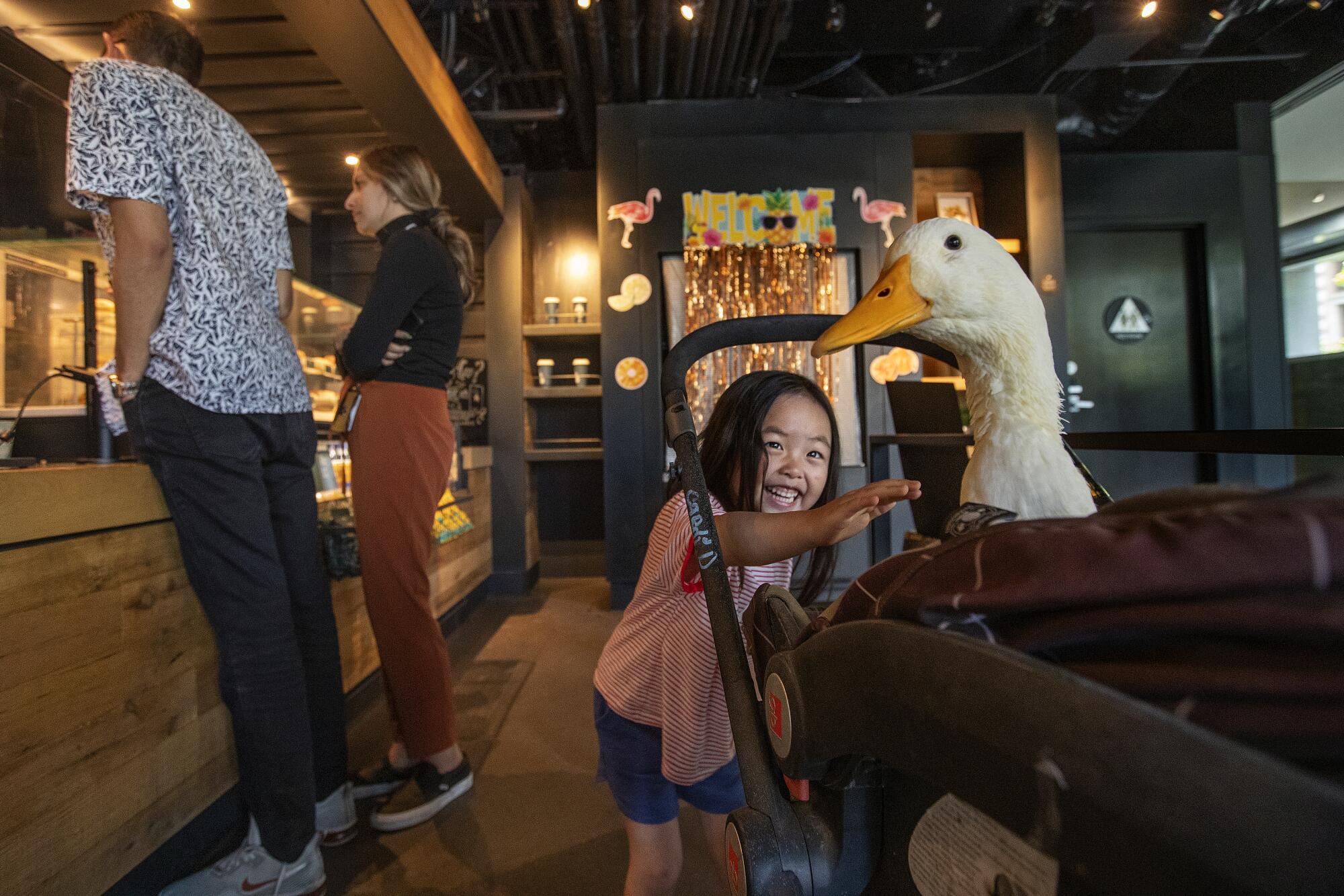
When two stern-faced security officers appeared on the nearby steps, McWilliams muttered, “Uh oh, here come the spoilers.”
“Sorry, she just gets hot,” she explained. Cardi D began to flap her wings as McWilliams pulled her out of the fountain and placed her back in the stroller.
As they continued their trek, they passed the Biltmore Hotel, the Park Fifth Tower Apartments and Pershing Square, where they come some nights so Cardi D can hunt cockroaches. Once McWilliams spotted a smoke shop, she parked her duck out front, still within eyesight. “You wait for Mommy,” McWilliams said. But as soon as she turned away, Cardi D tried to jump down and follow.
At the next smoke shop, McWilliams took Cardi D inside, explaining: “She’s my emotional support animal.” She’d left her official red vest at home, but no one inside objected.
They took a bus back to the tent in an effort to stay cool. Sitting in her stroller, Cardi D shook her tail feathers and peeked over the side, to the amusement of fellow passengers.
“That made me feel good,” McWilliams said after they got off the bus. “When I’m depressed, I pick her up and hold her and start rocking and she helps a lot. She keeps me calm. She shows me unconditional love.”
McWilliams was about to find out how much she needed that support.
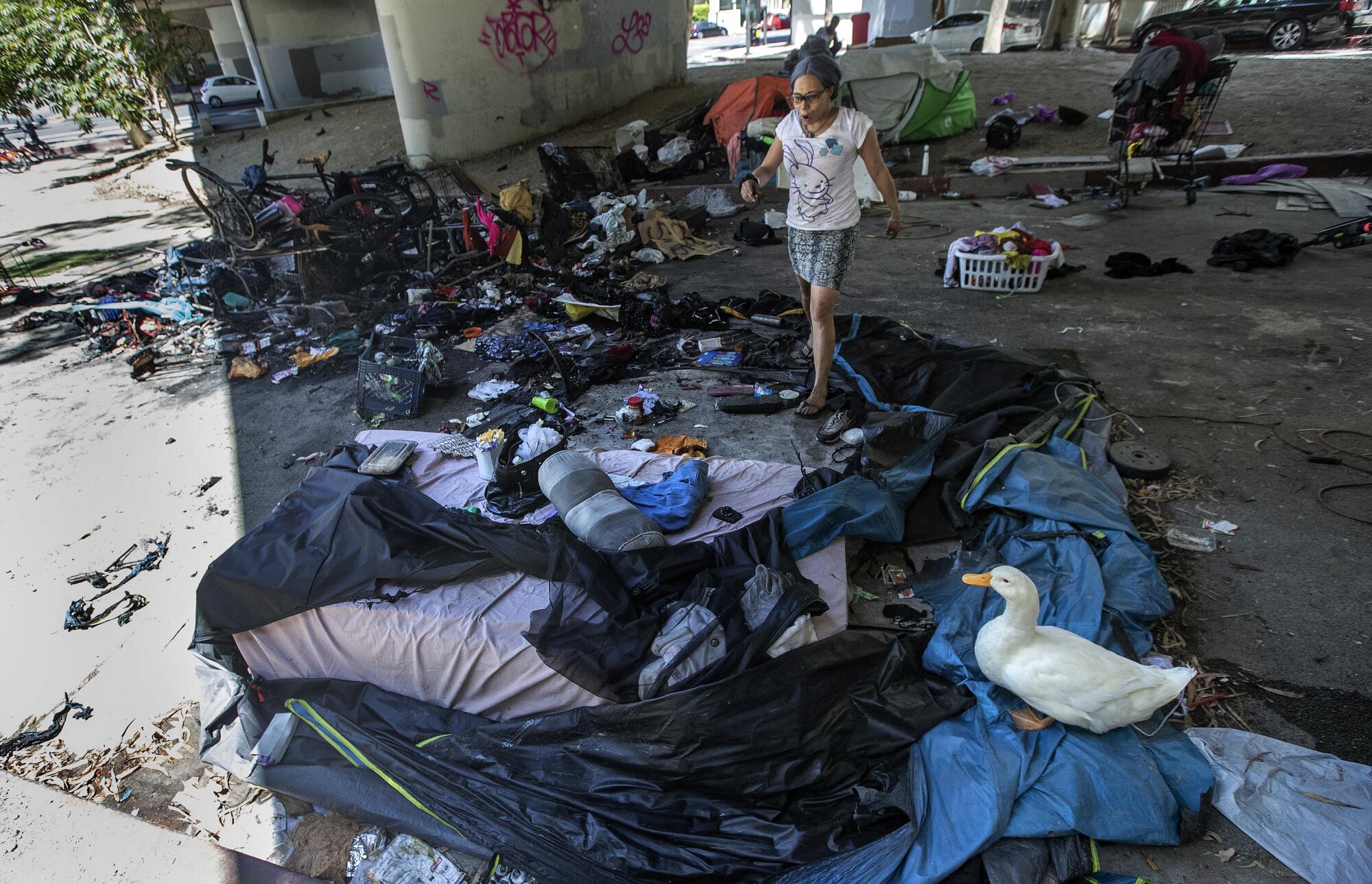
On Thursday, Aug. 4, an Akita killed Daddy the cat. Grief-stricken, they buried her in Echo Park next to their last duck, Cardi B. That weekend, McWilliams, her boyfriend and Cardi D were at the Commerce Casino when a friend video-called. On the small phone screen, they saw their tents ablaze. By the time they got back, what remained of their lives was smoldering and drenched.
“Everything we worked so hard for, gone in a flash,” McWilliams said. “This has been the worst week of my life.”
On Sunday morning, McWilliams picked through the charred remains. There were bicycles, toiletries, heaps of clothes and Daddy’s cat tower. Much of the pile was unrecognizable and carried the sickening smell of burned plastic.
Friends brought jeans, dresses and bras to replace what McWilliams had lost. Two people gave tents to help them rebuild.

McWilliams reached for her emotional support animal, who lay quietly on the melted tent. She stroked the duck for solace, leaving smudges of ash on the bright white feathers, and rested her forehead gently against Cardi D. The duck pressed her beak against McWilliams’ nose.
A week later, another twist. A feather at the top of Cardi D’s tail began to curl. By now, McWilliams had become well versed enough on Pekin ducks to know one thing: Cardi D was a he.
- Share via
Watch L.A. Times Today at 7 p.m. on Spectrum News 1 on Channel 1 or live stream on the Spectrum News App. Palos Verdes Peninsula and Orange County viewers can watch on Cox Systems on channel 99.
More to Read
Sign up for Essential California
The most important California stories and recommendations in your inbox every morning.
You may occasionally receive promotional content from the Los Angeles Times.
